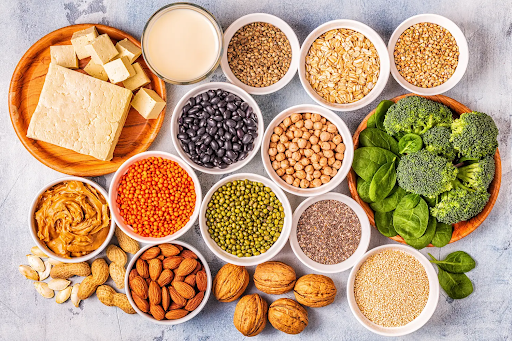Why Sugar Free Sauces Are a Game-Changer for Your Plant-Based Pantry
Why Sugar Free Sauces Are a Game-Changer for Your Plant-Based Pantry
Blog Article
All Regarding Healthy Food: Advantages of Enjoying Plant Based Choices
The conversation bordering plant-based diets has actually obtained considerable focus in current years. Numerous people are checking out the possible wellness advantages, dietary benefits, and ecological influences connected with these dietary options. As people become a lot more knowledgeable about their food's impact on well-being and sustainability, questions arise about the practicalities of adopting such a way of living. What details modifications can one expect, and just how might these selections reshape not just individual health yet likewise the earth's future?
Understanding Plant-Based Diet Plans
Numerous people associate plant-based diet regimens mostly with vegetarianism or veganism, these diet regimens can encompass a wide array of consuming patterns that focus on whole, minimally refined plant foods. Such diets frequently include fruits, vegetables, entire grains, nuts, seeds, and vegetables, while getting rid of or limiting animal items. This versatility allows people to tailor their nutritional selections according to individual choices and dietary demands. Some may take on a mainly plant-based diet plan while still periodically consuming meat or dairy products, often described as a flexitarian technique. The emphasis continues to be on including more plant foods, which can bring about a varied variety of tastes and meals. Recognizing these different analyses of plant-based consuming is vital for valuing its availability and charm in modern food society.
Wellness Conveniences of Plant-Based Foods
The health and wellness benefits of plant-based foods are significant, using a nutrient thickness advantage that sustains general wellness. Research study indicates that these foods can boost heart wellness and play a necessary function in efficient weight administration. By integrating extra plant-based choices, people may boost their nutritional choices and promote long-term wellness.
Nutrient Thickness Benefit
Nutrient density plays an essential function in the health and wellness benefits of plant-based foods, making them an engaging option for those seeking a balanced diet regimen. Plant-based foods, such as fruits, veggies, vegetables, nuts, and whole grains, are commonly rich in crucial vitamins, minerals, and antioxidants while being lower in calories. This high nutrient density permits individuals to consume fewer calories while still satisfying their nutritional demands. Additionally, these foods are loaded with nutritional fiber, promoting digestion wellness and assisting in weight management. By incorporating nutrient-dense plant-based choices, customers can enhance their overall health, support their body immune systems, and lower the risk of chronic illness. Inevitably, the nutrient thickness of plant-based foods underscores their relevance in a health-conscious way of living.
Heart Health Renovation

Weight Monitoring Assistance
Along with promoting heart health and wellness, a plant-based diet regimen can substantially help in weight administration. This dietary strategy stresses entire foods such as fruits, veggies, beans, nuts, and whole grains, which are generally reduced in calories and greater in fiber compared to animal-based products. The high fiber web content helps increase satiation, lowering total calorie intake. Furthermore, plant-based diets are commonly rich in essential nutrients while reduced in undesirable fats, making it less complicated to keep a healthy and balanced weight. Plant Based Beef. Study indicates that people that take on a plant-based way of living tend to have lower body mass indexes (BMIs) and experience even more effective weight management contrasted to those who consume meat-heavy diet plans. Embracing plant-based alternatives is a strategic choice for reliable weight management.
Nutritional Worth of Plant-Based Components
Plant-based ingredients are abundant in crucial nutrients, offering a diverse variety of vitamins, minerals, and anti-oxidants that add to overall wellness. A contrast of protein sources discloses that while animal items are commonly considered as superior, numerous plant-based options offer sufficient protein and other advantageous substances. Understanding the nutritional worth of these components can assist people make informed nutritional selections.
Important Nutrients in Plants
Nutrient-rich active ingredients discovered in plants offer a varied variety of essential nutrients that contribute significantly to total health. These ingredients are rich in vitamins A, C, and K, which sustain immune function, vision, and blood clotting, respectively. Furthermore, plants provide crucial minerals such as potassium, magnesium, and calcium, important for heart health and wellness, muscular tissue function, and bone strength. The presence of fiber in plant-based foods aids food digestion and advertises a healthy and balanced digestive tract microbiome. Anti-oxidants, found perfectly in fruits and veggies, aid combat oxidative stress and lower inflammation. Several plant foods are reduced in calories yet high in nutrients, making them an excellent choice for those seeking to keep a healthy weight while guaranteeing optimal nutrient intake.

Comparing Protein Resources
Healthy protein sources vary significantly in their nutritional profiles, with plant-based active ingredients supplying one-of-a-kind advantages. Unlike pet healthy proteins, which usually have hydrogenated fats and cholesterol, plant healthy proteins have a tendency to be reduced in these unhealthy parts. Legumes, nuts, seeds, and whole grains are rich in necessary amino acids, fiber, vitamins, and minerals. For circumstances, lentils supply high protein material alongside significant iron and folate, while quinoa is a full healthy protein, offering all nine vital amino acids. Furthermore, plant-based proteins are frequently gone along with by anti-oxidants and phytochemicals that sustain overall wellness. The change to plant-based protein resources not just improves dietary consumption however likewise aligns with lasting nutritional methods, reducing ecological impact and promoting long-term health and wellness benefits.
Ecological Effect of Plant-Based Eating
As understanding of environment adjustment expands, several individuals are checking out lasting dietary options that can considerably minimize their environmental footprint. Plant-based eating has emerged as a significant contributor to reducing greenhouse gas discharges, which are primarily linked with animals production. The growing of fruits, vegetables, legumes, and grains normally calls for fewer sources, such as water and land, compared to animal farming. In addition, plant-based diet regimens can result in lowered logging, as less land is required for grazing livestock or growing pet feed. By moving towards plant-based alternatives, consumers can sustain biodiversity and promote much healthier ecological communities. On the whole, accepting plant-based eating not only benefits personal wellness yet additionally stands for an essential step toward ecological sustainability and preservation efforts.
Conquering Common Misconceptions
While lots of people acknowledge the benefits of a plant-based diet regimen, a number of false impressions frequently prevent them from completely embracing this way of life. A common belief is that plant-based diet plans do not have adequate healthy protein; nevertheless, various plant resources, such as legumes, nuts, and tofu, give adequate healthy protein. Additionally, some presume that this diet regimen is costly, when as a matter of fact, staples like beans, rice, and seasonal vegetables can be fairly budget-friendly. Another misunderstanding is that plant-based eating is excessively limiting, whereas it really offers a varied array of foods and flavors. Many fret that a plant-based diet plan may lead to deficiencies, yet with proper planning, individuals can acquire all necessary nutrients, consisting of minerals and vitamins, while delighting in a vast variety of scrumptious dishes. Broad Tips for Transitioning to a Plant-Based Way of living
Making the change to a plant-based lifestyle can be an improving experience, though it often requires some support to navigate the first changes. First, people are urged to start slowly, including even more fruits, veggies, vegetables, and entire grains right into their dishes while more decreasing meat and dairy products intake. Dish preparation is necessary; preparing a weekly menu can aid relieve the modification and avoid last-minute unhealthy options. Discovering brand-new recipes and cooking methods can additionally keep and improve the experience exhilaration about plant-based consuming. Furthermore, joining assistance groups or neighborhoods can supply motivation and share useful pointers. Lastly, remaining notified about nutrition assurances balanced meals, protecting against shortages while fostering a healthy, enjoyable plant-based way of life.
Delicious Plant-Based Dish Ideas
Checking out delicious plant-based meal ideas can check my reference influence individuals to accept a much more nutritious diet plan. One popular alternative is a passionate quinoa salad, including cherry tomatoes, cucumber, and a zesty lemon-tahini dressing. An additional fave is a savory lentil stew, loaded with carrots, celery, and aromatic herbs, perfect for a reassuring dinner. For morning meal, overnight oats made with almond milk, chia seeds, and covered with fresh berries supply a nourishing start to the day. Furthermore, a lively vegetable stir-fry with tofu and a selection of vibrant veggies can be a fast yet pleasing dish. Velvety avocado salute on whole-grain bread, sprayed with flavors and seeds, supplies a basic yet delicious treat. These dishes showcase the range and richness of plant-based consuming.

Regularly Asked Questions
Can a Plant-Based Diet Plan Supply Sufficient Protein?
The concern of whether a plant-based diet plan can offer adequate protein prevails. Numerous sources, consisting of vegetables, nuts, seeds, and entire grains, can satisfy healthy protein requires successfully, sustaining a healthy and balanced diet for people.
Are Plant-Based Diet Regimens Appropriate for Kid?
The viability of plant-based diet regimens for kids relies on careful preparation. Appropriate nutrients need to be ensured, consisting of minerals, proteins, and vitamins. With appropriate assistance, such diet plans can sustain healthy growth and advancement in kids.
Exactly how Do I Eat in restaurants on a Plant-Based Diet regimen?
Eating in restaurants on a plant-based diet regimen entails looking for dining establishments with diverse food selections, asking for modifications, and exploring vegan-friendly alternatives. Planning in advance and interacting dietary choices can improve the eating experience while maintaining nutritional choices.
What Prevail Irritants in Plant-Based Foods?
Usual irritants in plant-based foods include soy, gluten, nuts, and seeds - Plant Based Chicken. People following a plant-based diet plan should understand these irritants and review tags very carefully to stay clear of damaging reactions and assure secure consumption
Can Plant-Based Diets Assist With Weight Loss?
Research study indicates that adopting a plant-based diet may help with weight reduction due to its commonly reduced calorie density and higher fiber material. This combination can boost satiation, aiding individuals handle their caloric consumption properly. Lots of people associate plant-based diet plans mainly with vegetarianism or veganism, these diets can incorporate a wide array of eating patterns that prioritize entire, minimally refined plant foods. Nutrient thickness plays an essential duty in the health advantages of plant-based foods, making them a compelling choice for those looking for a well balanced diet plan. Plant-based diet plans have been revealed to significantly improve heart health and wellness, as they commonly have aspects that support cardio function. In enhancement blog here to advertising heart health, a plant-based diet regimen can considerably assist in weight management. A common belief is that plant-based diet regimens do not have enough healthy protein; nevertheless, numerous plant sources, such as legumes, nuts, and tofu, offer adequate healthy protein.
Report this page